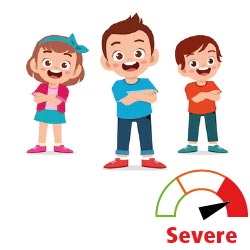- Avoid exposure to allergen
- In excessive nasal secretions (Rinorrhea,sneezing,itching):
- Klarihist 5mg/5ml syrup 2 teaspoon (10ml), once a day, with or without food
- In nasal obstruction:
- Otrivin 05% spray /drop 2-3drops in each nostrils up to 3 times daily
- In more sever :
- Rhinase 50mcg/dose nasal spray 1 spray per nostril onceDaily
- Unicast 5mg once daily at bed time
Loratadine
Available forms:
- Loratan, clara, histal, Klarihist, Loreen, Lorine Lohist, Ramitin:10mg tab, 5mg/5ml syrup
- Tidilor, Claritine, Lorax :10mg tab, 1mg/1ml syrup
- Loratin, Restamine:10mg tab
- Lostamin: 5mg/5ml syrup
Indications:
- Relief of symptoms associated with allergic rhinitis, such as sneezing, nasal discharge (rhinorrhea) as well as ocular itching and burning.
- indicated for the relief of symptoms and signs of chronic urticaria and other allergic dermatologic disorders.
Dose:
- Adults and children 6 years and older who weigh more than 30kg : 1 x tablet once daily
- Adults and children over 12 years of age: 2 teaspoons (10 ml), once a day, with or without food.
- The dosage for children aged 2-12 is by weight:
- Body weight over 30 kg: 2 teaspoons (10 ml), once a day, with or without food.
- Body weight of 30 kg or less: one teaspoon (5 ml), once a day, with or without food.
Pregnancy and breast-feeding :
As a precautionary measure, it is preferable to avoid the use of Loratadine Tablets during pregnancy. Loratadine is excreted in breast milk so preferable to avoid the use in lactation
side effect:
- drowsiness
- headache
- increased appetite
- difficulty sleeping.
Otrivine
Otrivine Nasal Spray contains the active ingredient xylometazoline hydrochloride which helps to open up and clear the nasal passages by reducing the excessive nasal secretions and returning the swollen blood vessels to their normal size.
Used in :
- nasal congestion (blocked nose, including colds)
- allergic rhinitis
- sinusitis.
- Not used>5 days Cause rebound congestion
Pregnancy : not recommended
Available forms:
- Otrivin 0.1% spray/drop , .05% spray /drop
- Decozal 0.1% spray/drop , .05% spray /drop
- Xylomet 0.1% spray
Dose:
Adult
- 0.1% Nasal drop 2-3 drops in each nostrils up to 3 times daily
Child>6y
- 0.05% Nasal drop 2-3 drops in each nostrils up to 3 times daily
Child 6months-6y
- 0.05% Nasal drop 1drops in each nostrils up to 3 times daily
Corticosteroids nasal spray (Fluticasone)
Available forms:
- Flixonase, Rhinase, Dalman, Avamys, Aierxem: 50mcg/dose
Indications:
corticosteroid indicated for the management of thenasal symptoms of perennial nonallergic rhinitis in adult and pediatric patients
aged 4 years and older.
Dose:
For intranasal use only. Recommended starting dosages:
- Adults: 2 sprays per nostril once daily (200 mcg per day).
- Adolescents and children aged 4 years and older: 1 spray per nostril oncedaily (100 mcg per day).
Montelukast
Available forms :
- Singulair
- Lukast
- Unicast
- Sincast
- Motrinex
- 4mg 5mg, 10mg Chewable tab
Action:
- Montelukast is in the leukotriene receptor antagonist family of medications. It works by blocking the action of leukotriene D4 in the lungs resulting in decreased inflammation and relaxation of smooth muscle
- Leukotrienes cause tightening of airway muscles and the production of excess mucus and fluid. These chemicals play a key role in allergies, allergic rhinitis, and asthma, also causing a tightening of your airways, making it difficult to breathe.
Indications
- Indicated in the treatment of asthma as add-on therapy in adults and adolescents from 15 years of age and older with mild to moderate persistent asthma who are inadequately controlled on inhaled corticosteroids and in whom “as-needed” short acting β-agonists provide inadequate clinical control of asthma.
- Montelukast Film-coated tablet can also provide symptomatic relief of seasonal allergic rhinitis.
- Indicated in the prophylaxis of asthma in which the predominant component is exercise-induced bronchoconstriction.
Pregnancy
- Montelukast may be used during pregnancy only if it is considered to be clearly essential.
Lactation
- Studies in rats have shown that montelukast is excreted in milk. It is not known if montelukast is excreted in human milk.
- May be used in breast-feeding only if it is considered to be clearly essential.
- Side effects:
- Headache
- Abdominal pain
- Upper respiratory infection
- Diarrhea, nausea, vomiting
- Elevated levels of serum transaminases (ALT, AST)
- Rash
- Pyrexia
Dose:
- Adult: 10mg once daily at bed time
- Children 6-14y: 5mg once daily at bed time
- 2-5 y: 4mg once daily at bed time
In Emergency room:
- Give Antihistamine In sneezing and rhinorrhea :
- Allerfin 10mg/ml IM injection :
Dose:
- 1-5 year : 25-5mg (½ ml )
- 6-12 year: 5-10mg (1ml )
- Adult : 10-20 mg (1-2 ml )
- Give Dexamethasone 4mg/1ml
Dose:
Pediatrics:
- 0.3 mg/kg/day IV / IM divided q6hr or q12hr
Adult:
- 4-8 mg IM /IV
Allergic rhinitis
Presentation :
- Rhinorrhea
- Repetitive sneezing
- nasal congestion, obstruction
- postnasal drainage
- Pruritus
- Itching of the palate, nose, ears, eye
- Snoring
- Frequent sore throats
- Cough
- Headache
- Itching redness watery eyes
Lines of management :
- Avoid exposure to allergens
- In excessive secretions and sneezing: oral antihistamine
- If nasal obstruction: Nasal decongestant
- For ocular symptoms: intranasal antihistamine
- If Symptoms persist and affect quality of life: Intranasal Corticosteroid
- Sever and persistent symptoms: Intranasal Corticosteroid + oral or intranasal antihistamine+ Oral leukotriene receptors antagonist
